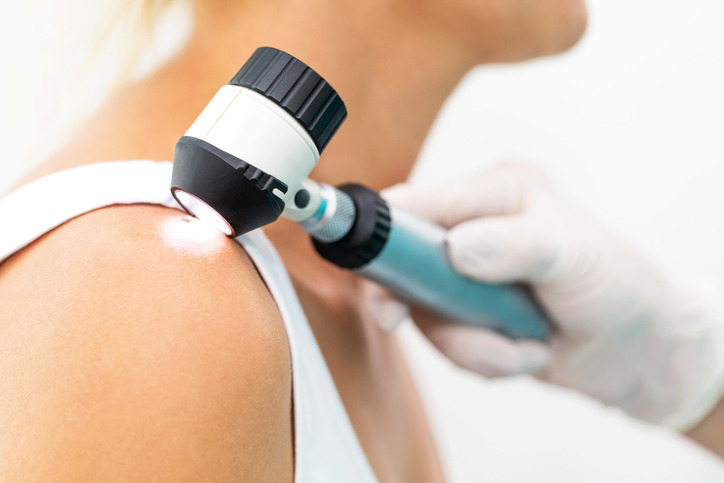Do you know your skin cancer risk?
October 13th, 2021
Certain types of skin are at greater risk for developing sun damage and skin cancer. While it’s true that people with fair skin tones are more at risk for sunburn, sun damage and skin cancer, UV exposure can raise skin cancer risk even if you tan and don’t burn.
The following factors may make your skin cancer risk higher:
Family history
If someone your immediate family has had skin cancer, your risk of developing it is higher. In fact, you’re twice as likely to develop skin cancer if there’s a history of skin cancer . Another significant risk factor is your personal history: if you have had any type of skin cancer you have increased risk of developing another skin cancer.
Your skin and hair colour
Your skin cancer risk can be categorized on the Fitzpatrick scale which is made of up of six skin types. Types 1 and 2 refer to ivory or very fair skin with naturally blonde or red hair and light coloured eyes. People with these types of skin have a higher risk of sun damage and likelihood of developing all types of skin cancers, including melanoma.
Age
People over 50 have the highest risk of skin cancer. If you are over 50 and notice any unusual or changing moles or sunspots, please contact us today for a Full Skin Assessment.
Number of moles/freckles
If you have lots of moles and/or freckles, it is worth getting regular skin checks or full body mole mapping to keep on eye out for any changes. This is also the case if you have one or more unusual moles – irregular in shape, uneven border, more than two shades.
Sunburn
Getting sunburnt – at any age, increases your risk of skin cancer as sunburn is sun damage. For skin protection tips, visit our skin protection page here.
Time spent outdoors
If your skin is exposed to the sun regularly through work or play, this can increase your risk of skin cancer. Whenever you’re outdoors, make sure you protect your skin in the sun and stay in the shade whenever possible.
If one or more of the above risk factors apply to you, contact us today for a Full Skin Assessment. Early detection means that skin cancers can be treated earlier which means a better prognosis.
When you visit the Upper Hutt Skin Clinic for your initial consultation, our highly trained Doctors and Nurses will give you a full skin assessment. This involves a full body skin examination with Dermatoscopy. A dermatoscope is a hand held instrument which uses epiluminescence microscopy to look deep into your skin, allowing our trained doctors to recognise the microscopic signs of skin cancer. It also gives you confidence that moles are normal and do not require excision. Full body mapping photography with Dermengine may also be recommended.
Your risk of skin cancer will then be assessed using New Zealand guidelines. A Personalised Management Plan will be developed, based on examination findings and risk. You will also be given recommendations and advice on treatments and skin care.
Following your full skin assessment you may require some treatment to remove or test a skin lesion or to treat areas of sun damaged skin. This will be discussed with you following your appointment, and a treatment plan which you are comfortable with agreed upon. You can feel safe in the knowledge that your risk for skin cancer has been assessed using the latest technology and you are in experienced hands.
